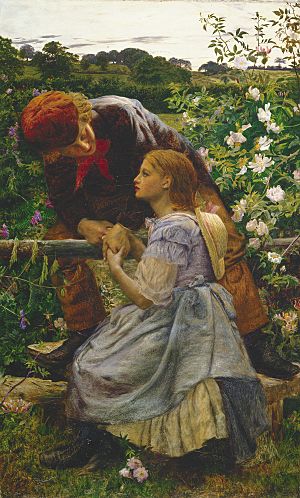Frederick Smallfield facts for kids
Quick facts for kids
Frederick Smallfield
ARWS
|
|
|---|---|

The artist's Early Lovers, 1857
|
|
| Born | 16 October 1829 |
| Died | 10 September 1915 (aged 85) Finchley, London
|
| Alma mater | Royal Academy Schools |
| Occupation | Artist |
Frederick Smallfield (1829–1915) was an English artist who lived during the Victorian era. He was known for his paintings using both oil paints and watercolour. His art showed influences from a special group of artists called the Pre-Raphaelite Brotherhood.
Becoming an Artist
Frederick Smallfield started his art training at the Royal Academy Schools in London during the late 1840s. This was a time when many important artists were studying there. Some members of the famous Pre-Raphaelite Brotherhood were also at the school around the same time. However, Smallfield wasn't a close member of their group.
Early Recognition
In 1858, a very famous art critic named John Ruskin wrote about Smallfield's watercolor paintings. Ruskin praised Smallfield's work in his book Academy Notes. This was a big deal for Smallfield's career.
Two years later, in 1860, Smallfield became an Associate of the Royal Watercolour Society. This showed that his talent was recognized by other professional artists.
Illustrations and Books
Smallfield also created illustrations for several books. These drawings helped bring stories and poems to life.
- He drew two pictures for a book called Passages From Modern English Poets (1862). These were named The Shoeblack and A Christmas Invitation.
- He also contributed an illustration called A Father's Lament to a book of poems by Robert Aris Willmott (1863).
- Another one of his drawings appeared in a large book about the Great Exhibition of 1851.
Exhibitions and Collections
Frederick Smallfield regularly showed his oil paintings at the Royal Academy in London. He continued to exhibit his art there until the late 1870s.
Today, you can find his artwork in several art galleries and museums:
- The Royal Institution of Cornwall has his painting The Ringers of Launcells Tower (1887).
- Manchester Art Gallery owns his painting Early Lovers (1857).
- The Atkinson Art Gallery in Southport has his work called The Lost Glove (1858).
- Some of his drawings are kept at the Victoria and Albert Museum in London. These include a sketch of a wall decoration by John Gregory Crace.
 | Valerie Thomas |
 | Frederick McKinley Jones |
 | George Edward Alcorn Jr. |
 | Thomas Mensah |

